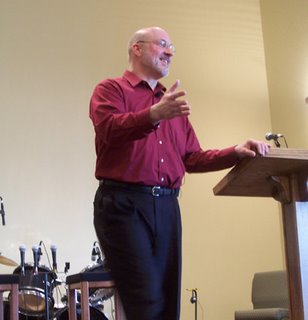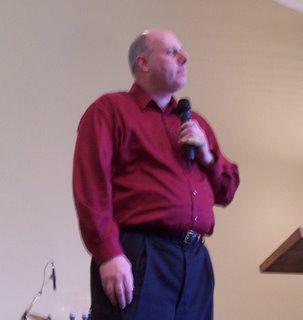Justin Taylor pointed to an article written by Steven Sjogren entitled,
"Don't be original, be effective." After reading Sjorgren's article, it is clear that he believes it is a good practice to use someone else's sermon before your congregation. You may even say it is noble, for you acknowledge too much is at stake to not use someone else's and "hit a home run."
There are three great articles to look at that deal with what is plagiarism and why it's wrong:
Justin Taylor:
Plagiarizing in the PulpitMatt Perman and Justin Taylor:
What is Plagiarism?Ray Van Neste:
Pastoral PlagiarismThese guys do a great job of breaking down why it is wrong to use someone else's sermon and not credit them.
IF a pastor wanted to, it is probably morally permissable to preach someone else's sermon as long as you give credit that it is not your own. While there may be an
extremely rare occasion where this would be beneficial, I would argue for the following reasons, it is more than likely a terrible idea:
1. Carbon copied passion. Hearing a pastor preach on a passage can not replace doing personal study of a passage. In the same way, preaching a sermon from someone else can not involve, nor convey the same passion as the original. People are getting the explanation of your interaction with the product of someone elses study in the Word. Resolution is bound to be lost.
2. The pastor is a person. In the articles listed above, they actually cite times where pastors used someone else's personal illustrations. Are you actually getting a message from a person or a performance? At that point, the pastor is no longer fulfilling the role of shepherd, but instead is playing the role of actor.
3. It idolizes performance. Instead of preaching, performance becomes the key:
a.) The church sits on the edge of their seats waiting for that "homerun." A church that can't handle a sermon that would be classified "a double" or "a triple" is in serious trouble. I love preaching and see all the Biblical principles for it. However, a church that's survival is based on the sermon is ignoring much of what makes the church a church.
b.) What makes it a "homerun?" If a pastor repeats a message verbatim, or must use the points or outline of a previous message, odds are it was not the content but rather the presentation that wowed him. People begin to expect juggled puppies and amazing light shows to keep their attention. The focus is not on the content but on the presentation. Frankly, that's a trend much of the church has already fallen for. Preaching someone else's sermon does nothing to help with that problem.
4. The pastor is robbed. When I was with a speaking ministry, we were expected to preach certain sermons repeatedly. I noticed with those messages that I never had the same passion, and never personally interacted with the text like I did the first time or two I preached it. [I've even noticed the same issue with preaching two services. Convential wisdom would suggest that second service should always be better, for you could work out bugs from the first service. However, I typically feel much more comfortable with the sermon in first service than the second.] Forget how the congregation is getting a copy of a copy, the pastor is doing this to himself as well. I also noticed it created a tendancy to preach down to the people instead of preaching as one of the people.
5. You're stealing from your congregation. In
Acts 6:4, the elders of the church remind the Body that their ministry is to be to the Word and prayer. A pastor who is not doing that, but rather, is using someone else's ministry to the Word, is not doing part of what they are there to do. If the pastor is paid, he should probably offer to give some of his money back since he didn't do that portion of the job. (Please don't hear me say that the only responsibility of the pastor is to preach. There are many more things. But it is certainly one of his primary responsibilities.)
So how can you help me?--If you hear something profound from me, assume I got it from someone else. Come and ask me where I got that from and remind me that I need to credit sources. (Plagiarism that is unintentional is still wrong.)
--If you here something profound, and I claim it is original, follow up by asking me what I've been reading and listening to lately. If I stagger around with that, it's probably safe to assume I'm embarrassed to admit it, because that would reveal my sources. (If I would purposely plagiarize, I would probably lie about doing it too. Watch for the nonverbal cues that would give that away.)
--Comment on content. Rather than just saying, "That was a good sermon" or "Nice job today" try telling me about the content. Share what about God's Word impacted you, or what application you are taking with you. This reduces the pressure of having the great illustration or being especially catching and puts the focus back on exalting God.
--Hold me to the text. If you sense I am preaching soapboxes or taking passages away from the text for that morning, come talk to me about it.
Of course, if we are all preaching from the same Bible, and we are striving to preach the author's intent, messages will seem similar. But is not only immoral to preach someone elses sermon, it is not beneficial to the Body either.
But Rick Warren wouldn't agree with me. After all, the article suggesting we use others sermons was found on his
pastors.com website. (Please understand I only mention that to show that problems I have with much of the Purpose Driven approach are philosophical and are not an issue of personality.)

 Daniel Pierce, Church Planting Coach
Daniel Pierce, Church Planting Coach



